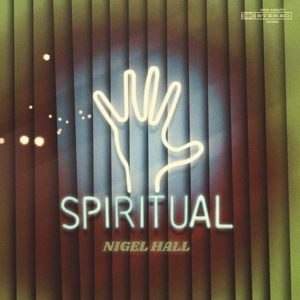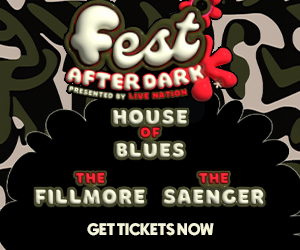Kismet is a well-known notion in the life of Nigel Hall. It was kismet that led him to his current band, Lettuce, the group behind such hits as “Phyllis” and a Grammy-nominated album, Elevate, in 2019. Such serendipity also introduced him to the title and concept behind his second solo album, Spiritual, released in July.
“I had two different names that I had narrowed it down to. It was Spiritual and Blessed Blackness,” Hall recalls. “[In the recording studio,] we would all say we were in the spiritual ham zone.” While trying to escape the zone, searching for a bar to “let our hair down a little bit,” Hall and company passed a palm reader’s business on the street.
The scene that would become the album’s cover greeted Hall like a neon-lit lodestar, hand aglow with the very word he’d been shouting for a good part of the day. Hall thought to himself, “That’s a sign from God. It’s going to be Spiritual.” He immediately shot a photo of the sign on his cellphone, and the rest, as they say, is history. While its title was born from studio shenanigans, the record takes a sobering path in more ways than one.
 Spiritual candidly relates Nigel’s life and times, free of airs, obligations, and expectations. “It’s a story of vulnerability…a story of somebody really trying to understand what it’s like to be growing and what it’s like to live in this fucked-up world,” said Hall.
Spiritual candidly relates Nigel’s life and times, free of airs, obligations, and expectations. “It’s a story of vulnerability…a story of somebody really trying to understand what it’s like to be growing and what it’s like to live in this fucked-up world,” said Hall.
Regardless of a past Grammy nomination or whatever masterpiece he may release in the future, Hall says that the album will remain his proudest achievement—children notwithstanding. Spiritual marks his first glance in a long time at music through “a beginner’s [as well as] a sober lens.”
“I can hear the agony that I was going through. I can hear the joy that I was experiencing, but that’s why I say this record is the thing that I’m most proud of because it is unapologetic…everything that is me. The things that I love about myself. The things that I hate about myself.”
Spiritual is just as lofty as its name implies, blending Stevie Wonder sounds à la “People in Search of a Life,” a touch of lounge in “Caribou,” and evading categorization in any single genre or mood. Rarely if ever does Hall approach an album with a particular sound in mind, this one least of all. His compositions begin as a glimmer of inspiration that could “end up something completely different than how it started.” To that end, Hall prefers to define Spiritual simply as “just music…music from somebody’s fucking heart and soul. It’s music from somebody’s heaven and somebody’s hell.”
Hall didn’t seek out the “the best musicians in the world” for this album but rather the “right ones.” However, Hall boasts that he “was blessed to have both the best and the right musicians.” Spiritual includes some supernatural talent with names like Patrice Rushen, Jeff Coffin and fellow Lettuce bandmate Ryan Zoidis.
In addition to its star-studded lineup and personal significance, this record, as well as Hall’s previous album, Ladies and Gentlemen…Nigel Hall, differentiate themselves from his work with Lettuce in the intent or motive. In addition to presenting a raw display of Hall’s feelings, with tracks like “Gotta Go to Work” and “Change Directions,” Spiritual allowed the songsmith to slip into the role of social critic.
Although Hall holds that music is “for everybody” and one of the few uniting forces on the planet, he emphasizes that he made Spiritual with Black people in mind. The record was intended as somewhat of a balm for the pain and a beautiful reminder that “it feels so good to be Black” despite the struggle. Much of these “heavy Blackness” themes were drawn from the city that lured him away from the East Coast nearly ten years ago, New Orleans.
“The Blackness here is heavy, and that’s why I love it. I love being around my people. I gotta be around my people, and my people are definitely holding me down right now.” Coupled with the effortless musicality of the Big Easy, Hall feels that there are few places like it in the world. “There’s music in the birds…Music [when] I get up at five o’clock in the morning and walk to City Park. And there’s music in the park,” Hall said. “New Orleans is a beautiful place, and I’m not going anywhere anytime soon.”
To keep up with Nigel Hall’s music and performances, check out his official website and Spotify page. You can also read Jay Mazza’s review of Spiritual from the August digital edition of OffBeat.



